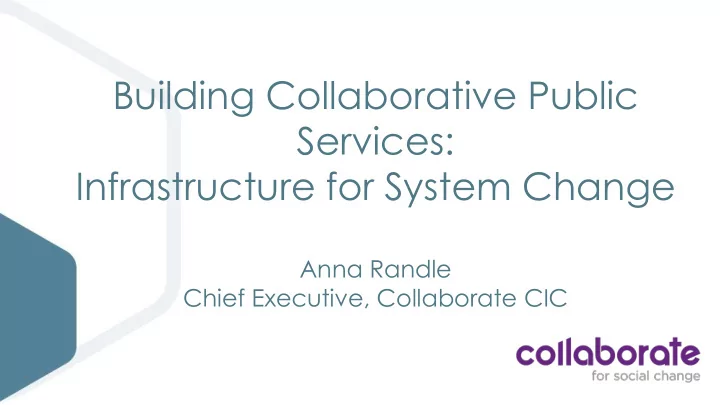

Building Collaborative Public Services: Infrastructure for System Change Anna Randle Chief Executive, Collaborate CIC
Public services stocktake … - Traditionally designed to respond to problems - Tend towards paternalism – ‘solving problems’, not supporting communities to be part of the solution - Struggle to respond to the complex nature of people’s needs - Demand is ever-increasing - Inequalities & variation in core outcomes – health, education, economic participation - The most vulnerable are at the hard edge of these challenges - Challenging operating environment – austerity, integration, devolution
Less of the same and small-scale innovation aren’t enough
Public services need to change. But how?
3 shifts in local public services Re-cast public services as part of a local system, • inlcuding many actors that can influence outcomes Consider how the collective power of the system can be • mobilised to address a common cause, understanding different roles people & organisations can play Use public money to invest in, build & influence the • system
We need to build collaborative places
“A range of organisations in a place, including public services, the VCS and individuals, guided by common values & principles, working towards shared aims” = local system change?
A ‘whole system, whole place’ approach to change
But how do we do it?
The perception gap There are some excellent examples emerging (MEAM!) • Lots of innovation • Lots of ambition around collaboration & system change • New principles for public services •
But projects get stuck at the margins of wider systems
We pay too little attention to the foundations for collaboration & system change And organisational infrastructure fractures collaboration
Collaborative system infrastructure Behaviours and values Principles for change Shared vision Relationships
To translate collaborative ambition into new culture & practice we need to build new, enabling infrastructure – the ”hard - wiring”
9 key elements They can create a gravitational pull towards or away from collaboration & system change
H ow can we ‘re - wire’ these for collaboration & system change?
Strategies & plans Governance Outcomes & accountability Funding & commissioning Culture change & OD Delivery Data Learning & relationship building platforms & spaces Communications & engagement
Place-based strategies & plans A co-produced strategy that sets out the social & economic vision for the place as a shared challenge between partners & citizens Core operating principles for public services The foundation for local collaboration “We need clarity of vision & outcomes to do our bit” – voluntary sector organisation
Governance System leaders - leaders of organisations and the group who guide and support the place-based system Focus on developing collaboration And the stewardship, building & sustaining of the place-based system and collaborative infrastructure “The council’s role is the coordination of equals” - voluntary action organisation
Outcomes & accountability Place-based outcomes representing shared goals The social & economic changes that will be achieved over a period of time through systemic collaboration Mutual accountability is based on shared responsibility & reciprocity “The collective responsibility is the same – but all the partners have their own unique role in making it happen” – Police officer
Funding & commissioning Place-based funding models & commissioning practice that reflect place-based plans & outcomes, values and behaviours And support new forms of collaborative delivery, learning & adaptation “Place -based funding is a big opportunity if it leads to more flexible commissioning” – voluntary sector organisation
Culture change & people development Building capacity to create leaders, organisations, workforce & communities that are ready to work collaboratively Cross-sector approaches to workforce development New role for the frontline “Culture change is the biggest barrier” – council officer
Delivery Collaborative, integrated service delivery that puts into practice the principles for collaborative public services outlined in the place-based strategy “We are changing the behaviour & practice of the frontline. People need to go beyond their usual remit. The police’s job is to work collectively with others to improve lives in the area” – Police officer
Data, evidence & evaluation Collaborative & adaptive learning & evaluation, supported by shared data Provides the foundation for collective understanding into the root causes of need & demand Provides insights about the impact of shared investment decisions “We need shared data to inform commissioning & help us manage demand across the system” – council officer
Collaborative platforms: Learning & relationship building Physical or virtual spaces that bring together people & organisations Enable them to connect, develop networks & share information ‘Junction boxes’ of the place -based system “We need places & spaces that can enable people to solve the things they want to change in their lives” – Ignite project
Communications & engagement Communications & engagement that reinforces shared endeavour Ensures people can inform the principles & strategy Enables people to share insight & information through the system Allows real-time collaboration & adaptive delivery “Communication enables collaboration” – voluntary sector organisation
Shifting from ambition & small scale innovation to fundamental system change is the work of today’s public servants
Collaborate is an independent CIC based at London COLLABORATE Southbank University, focusing on the thinking, culture and practice of cross-sector collaboration in public Clarence Centre for Enterprise & Innovation services. We believe that an increasingly complex operating environment needs an outcomes-focused 6 St George’s Circus, London, SE1 6FE and more collaborative approach – and we work with government, business and civil society to make this T: +44 (0)20 7815 8297 happen in practice. Instead of ‘public services’, Collaborate facilitates coalitions developing ‘services www.collaboratecic.com to the public’ – efficient, dynamic services that have a closer relationship with the people using them and are @CollaborateIns more resilient to the challenges they face.
Recommend
More recommend